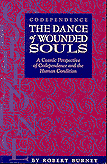to a page of
Joy2MeU
The Web Site of Spiritual Teacher, codependence counselor, grief therapist, author, Robert Burney and Joy to You & Me Enterprises

Go to Home Page
Robert is the author of the Joyously inspirational book
The Dance of Wounded Souls

![]()
The Emotional Dynamics of Dysfunctional
Romantic Relationships 2
"It is normal for relationships in this society to deteriorate into power struggles over who is right and who is wrong"
This is a continuation of the web page: The
Emotional Dynamics of Dysfunctional Romantic Relationships
This page includes quotes from Codepenence: The Dance of Wounded Souls and quotes from other articles, columns, and web pages written by Robert Burney. The internal links within this article open in a separate browser window.
Here are two excerpts from
Codependence: The Dance of Wounded Souls:
"I am now going to share with you some new descriptions that I came up with in regard to these behavioral defenses. We adopt different degrees and combinations of these various types of behavior as our personal defense system, and we swing from one extreme to the other within our own personal spectrum. I am going to share these with you because I find them enlightening and amusing and to make a point. Behavioral Defenses
The Aggressive-Aggressive defense, is what I call the "militant bulldozer." This person, basically the counterdependent, is the one whose attitude is "I don't care what anyone thinks." This is someone who will run you down and then tell you that you deserved it. This is the "survival of the fittest," hard-driving capitalist, self-righteous religious fanatic, who feels superior to most everyone else in the world. This type of person despises the human "weakness" in others because he/she is so terrified and ashamed of her/his own humanity.
The Aggressive-Passive person, or "self-sacrificing bulldozer," will run you down and then tell you that they did it for your own good and that it hurt them more than it did you. These are the types of people who aggressively try to control you "for your own good" - because they think that they know what is "right" and what you "should" do and they feel obligated to inform you. This person is constantly setting him/herself up to be the perpetrator because other people do not do things the "right" way, that is, his/her way.
The Passive-Aggressive, or "militant martyr," is the person who smiles sweetly while cutting you to pieces emotionally with her/his innocent sounding, double-edged sword of a tongue. These people try to control you "for your own good" but do it in more covert, passive-aggressive ways. They "only want the best for you," and sabotage you every chance they get. They see themselves as wonderful people who are continually and unfairly being victimized by ungrateful loved ones - and this victimization is their main topic of conversation/focus in life because they are so self-absorbed that they are almost incapable of hearing what other people are saying.
The Passive-Passive, or "self-sacrificing martyr," is the person who spends so much time and energy demeaning him/herself, and projecting the image that he/she is emotionally fragile, that anyone who even thinks of getting mad at this person feels guilty. They have incredibly accurate, long-range, stealth guilt torpedoes that are effective even long after their death. Guilt is to the self-sacrificing martyr what stink is to a skunk: the primary defense.
These are all defense systems adopted out of a necessity to survive. They are all defensive disguises whose purpose is to protect the wounded, terrified child within.
These are broad general categories, and individually we can combine various degrees and combinations of these types of behavioral defenses in order to protect ourselves."
*** "The expanded usage of the term "Codependent" now includes counterdependent behavior. We have come to understand that both the passive and the aggressive behavioral defense systems are reactions to the same kinds of childhood trauma, to the same kinds of emotional wounds. The Family Systems Dynamics research shows that within the family system, children adopt certain roles according to their family dynamics. Some of these roles are more passive, some are more aggressive, because in the competition for attention and validation within a family system the children must adopt different types of behaviors in order to feel like an individual.A large part of what we identify as our personality is in fact a distorted view of who we really are due to the type of behavioral defenses we adopted to fit the role or roles we were forced to assume according to the dynamics of our family system."

Each of us has our own spectrum of behavioral defenses to protect us from fear of intimacy. We can be codependent in one relationship and counterdependent in another - or we can swing from co to counter - within the same relationship.Classic Codependent Couple